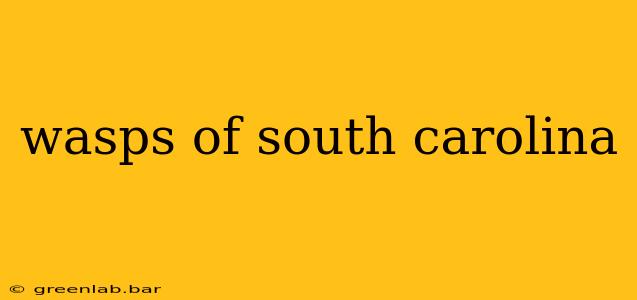South Carolina, with its diverse ecosystems ranging from coastal plains to mountainous regions, boasts a rich variety of wasp species. Understanding these insects, their behavior, and how to interact safely with them is crucial for residents and visitors alike. This guide provides a comprehensive overview of common South Carolina wasps, focusing on identification, habitat, and safety precautions.
Common Wasp Species Found in South Carolina
South Carolina's warm climate provides ideal conditions for numerous wasp species. Some of the most frequently encountered include:
1. Paper Wasps (Polistes spp.)
- Identification: These wasps are easily recognizable by their slender bodies, long legs, and characteristic paper nests, often found under eaves, decks, or in shrubs. They are typically brown, yellow, or reddish-brown.
- Habitat: Paper wasps prefer building their nests in sheltered, protected areas.
- Behavior: While generally not aggressive, they will defend their nests fiercely if provoked.
2. Yellow Jackets (Vespula spp. and Dolichovespula spp.)
- Identification: Yellow jackets are known for their bright yellow and black banding. They are stockier than paper wasps and build nests underground or in wall voids.
- Habitat: Yellow jackets are highly adaptable and can nest in a wide variety of locations.
- Behavior: Yellow jackets are more aggressive than paper wasps and are known to sting repeatedly if disturbed. Their nests are often near food sources, increasing the chance of accidental encounters.
3. Bald-faced Hornets (Dolichovespula maculata)
- Identification: These large social wasps are predominantly black with white markings on their face and body. They build large, grey, papery nests, often high in trees or shrubs.
- Habitat: Bald-faced hornets prefer building their nests in high, protected locations.
- Behavior: Similar to yellow jackets, they are aggressive when defending their nests.
4. Mud Daubers (Sceliphron spp.)
- Identification: These solitary wasps are characterized by their slender bodies and elongated abdomens. They build distinctive mud nests, often found on walls, ceilings, or under eaves.
- Habitat: Mud daubers build their nests using mud, creating small, individual cells to house their larvae.
- Behavior: Mud daubers are generally docile and rarely sting unless directly handled.
Wasp Habitats in South Carolina
Wasps exhibit diverse habitat preferences, influencing where you are most likely to encounter them:
- Wooded areas: Paper wasps, bald-faced hornets, and various other species thrive in wooded and forested regions.
- Urban environments: Yellow jackets and paper wasps frequently build nests in and around human structures.
- Gardens and yards: Many wasp species are attracted to flowering plants and gardens providing food sources.
Safety Precautions Around Wasps
While most wasp stings are not life-threatening, they can cause painful reactions. It’s crucial to take precautions:
- Avoid nests: Maintain a safe distance from any visible wasp nests.
- Don't swat: Avoid swatting at wasps, as this can provoke them to sting.
- Wear protective clothing: If working outdoors, consider wearing protective clothing.
- Use caution near food: Be mindful of wasp activity when eating or drinking outdoors.
- Seek professional help: If you have a large or dangerous nest near your home, contact a pest control professional.
Understanding the Role of Wasps in the Ecosystem
Despite their sometimes unpleasant reputation, wasps play a vital role in South Carolina's ecosystem. They are effective pollinators and natural predators of various insects, helping control pest populations.
Conclusion
Understanding the diverse wasp species of South Carolina and practicing safe interaction are essential for coexistence. By recognizing the different species, understanding their habitats, and taking appropriate safety precautions, you can minimize the risk of stings and appreciate the valuable role these insects play in the environment. Always prioritize safety and consult with pest control professionals for serious infestations or concerns about wasp nests near your home or business.

